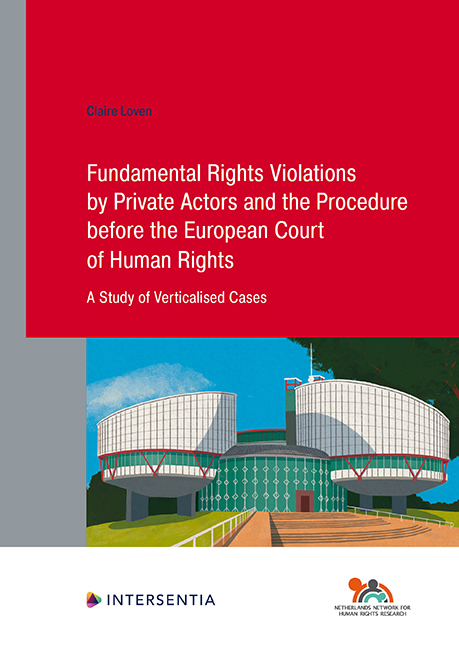 Fundamental Rights Violations by Private Actors and the Procedure before the European Court of Human Rights
Fundamental Rights Violations by Private Actors and the Procedure before the European Court of Human Rights Book contents
- Frontmatter
- Acknowledgments
- Contents
- INTRODUCTION
- PART I INTRODUCTION TO THE CONVENTION SYSTEM
- PART II VERTICALISED CASES UNRAVELLED
- PART III PROBLEMS IN VERTICALISED CASES
- PART IV TOWARDS A NEW APPROACH TO VERTICALISED CASES
- CONCLUSION
- Summary in Dutch
- Bibliography
- Appendix 1 Overview case law sample
- Curriculum Vitae
- Human Rights Research Series
Chapter 4 - Characteristics of ECtHR Proceedings
Published online by Cambridge University Press: 29 February 2024
- Frontmatter
- Acknowledgments
- Contents
- INTRODUCTION
- PART I INTRODUCTION TO THE CONVENTION SYSTEM
- PART II VERTICALISED CASES UNRAVELLED
- PART III PROBLEMS IN VERTICALISED CASES
- PART IV TOWARDS A NEW APPROACH TO VERTICALISED CASES
- CONCLUSION
- Summary in Dutch
- Bibliography
- Appendix 1 Overview case law sample
- Curriculum Vitae
- Human Rights Research Series
Summary
INTRODUCTION
As a final step in introducing the Convention system, this chapter explores the main characteristics – more specifically, the procedural rules and standards – of proceedings before the ECtHR. First, procedural rules and standards directly governing the Court's proceedings on the basis of certain Convention provisions and Rules of Court are explored (Section 2). Second, a short overview is provided of the procedural standards of Article 6 (the right to a fair trial) and Article 13 ECHR (the right to an effective remedy) (Section 3.1). At first sight, these standards seem less relevant for the characteristics of the ECtHR proceedings as they are directed to domestic authorities and, therefore, do not apply directly to the ECtHR proceedings. However, they are discussed separately as it is often argued that the Court should adhere, in its own proceedings, to the procedural standards it has formulated for domestic courts. This argument is discussed in more detail in Section 3.2.
By discussing procedural rules and standards, this chapter serves as a basis for the subsequent analysis and evaluation of the Court's current approach to verticalised cases. Given that part of the main research question in this study concerns how the Court can deal with verticalised cases while taking due care of the procedural rights of private actors, this chapter focuses on aspects of the proceedings and procedural standards of most relevance to this question rather than on providing a detailed and comprehensive overview of ECtHR proceedings.
PROCEDURAL RULES AND STANDARDS DIRECTLY GOVERNING ECtHR PROCEEDINGS
This section starts by discussing some procedural rules and standards that follow from the Convention and the Rules of Court and that apply directly to the proceedings before the ECtHR. First, the question is discussed as to who has standing before the ECtHR. This relates to the right of access to a court (Section 2.1). Subsequently, a short overview is provided of the Court's procedural rules and standards for hearings, access to documents, third-party intervention, and giving reasons for judgments and decisions (Section 2.2).
WHO HAS STANDING BEFORE THE ECtHR?
The first question regarding the rules applying to proceedings before the ECtHR concerns the criteria to be met for an application to be declared admissible. The admissibility criteria are laid down in Article 35 ECHR. First, an applicant must have exhausted all domestic remedies and file an application with the ECtHR within four months after the final decision on the matter by the domestic legal system.
- Type
- Chapter
- Information
- Fundamental Rights Violations by Private Actors and the Procedure before the European Court of Human RightsA Study of Verticalised Cases, pp. 55 - 72Publisher: IntersentiaPrint publication year: 2022


